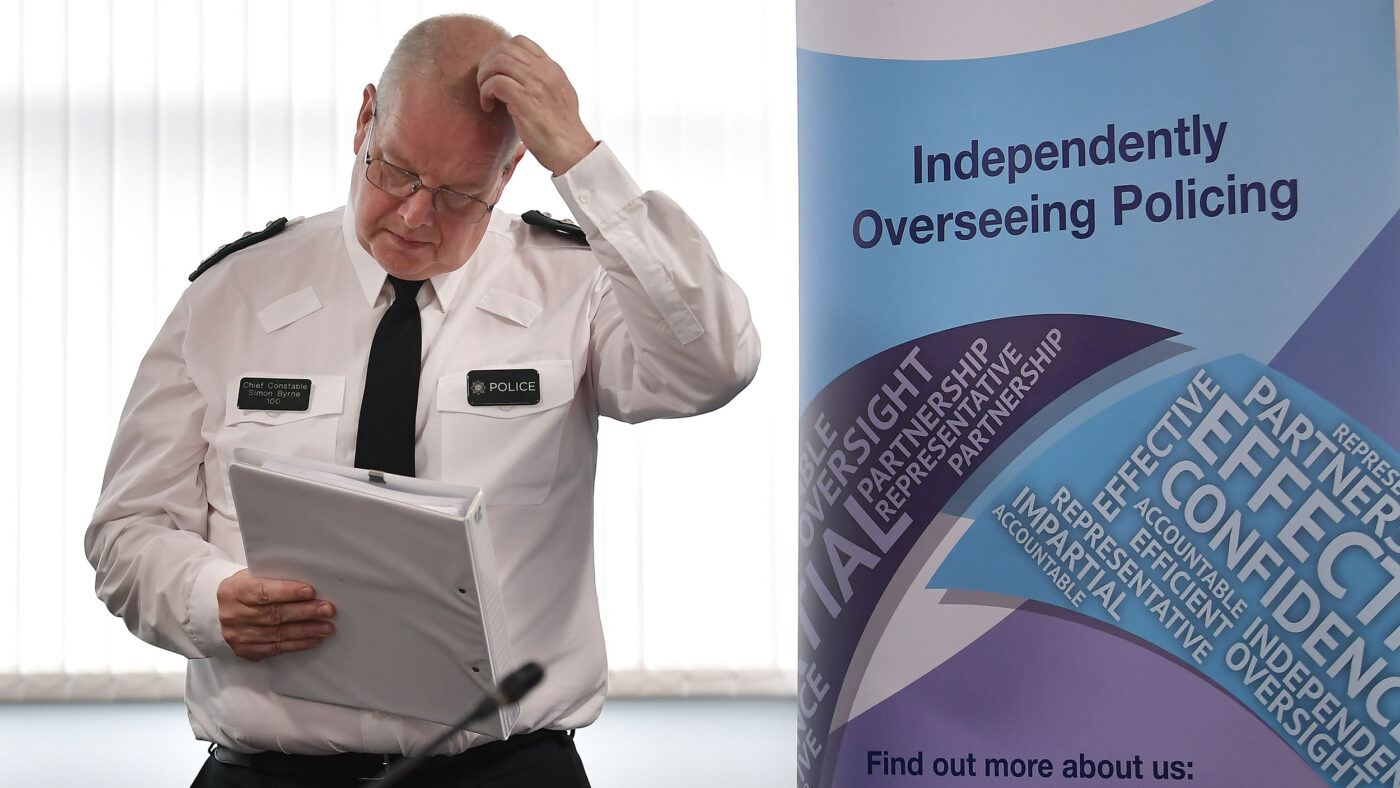The Chief Constable of the Police Service of Northern Ireland is under increasing pressure to resign, after a High Court judge found that two junior officers were unlawfully disciplined to placate Sinn Fein. It is the latest controversy in a disastrous summer for Simon Byrne and the PSNI. Previously, it emerged that a high profile data breach had placed his staff’s personal details in the hands of dissident republican terrorists.
The latest incident, though, has particularly incensed unionists, who have long alleged that Sinn Fein and its supporters are treated differently to other parts of Ulster society by the PSNI’s leadership, as well as judges, the government and elements of the media. In order to keep Irish republicans involved in politics rather than violence, it’s claimed their past crimes are whitewashed, more recent misconduct is excused and the rules that apply to the rest of us are frequently waived.
This theory will be boosted by the court case, which showed that two junior police officers were disciplined by the PSNI, not because their conduct merited action, but to prevent ‘republican support for policing’ from being withdrawn.
The proceedings related to a commemoration, during Covid restrictions in 2021, of an infamous loyalist shooting at a bookmakers on the Ormeau Road in Belfast. The officers who attended the event said they encountered hostility from the crowd and one man was arrested, handcuffed and detained on suspicion of disorderly conduct.
This incident, according to the officers’ legal team, prompted a ‘frenzy of activity’ by Sinn Fein politicians, who effectively pressured the PSNI into taking disciplinary action. The party was particularly aggressive, because an alleged ‘show of strength’ by masked men in a loyalist area had not immediately resulted in arrests, though there were later several prosecutions.
Sinn Fein’s Northern Ireland leader, Michelle O’Neill, accused the police publicly of ‘turning a blind eye to UDA and UVF thugs, while targeting those laying flowers on the anniversary of loved ones (deaths)’.
The Old Bailey bomber and MLA, Gerry Kelly, contacted the deputy chief constable by telephone to voice his opinions on the matter. This seasoned former terrorist, who wrote a book that celebrated leading a mass breakout from the Maze prison, during which he is believed to have shot a prison officer, is now the party’s policing spokesman.
As the High Court judge, Mr Justice Scofield, concluded on Tuesday, ‘Both the deputy chief constable and the chief constable were acutely aware of the threat of Sinn Féin withdrawing support for policing and/or withdrawing from the Policing Board if immediate action was not taken in respect of the officers’ duty status.’
He continued, ‘I have been persuaded that the respondent imposed suspension… because of the threat (whether real or perceived) that, if it did not do so, republican support for policing would be withdrawn.’ The judge upheld the appeal by the two officers, one of whom had been suspended at the time and one of whom had been ‘repositioned’.
The fact that the PSNI subjected two of its officers to unfair treatment to mollify Sinn Fein is shocking, but it is far from the first time the force has been accused of giving the party and its supporters special treatment. Indeed, its lawyers made the argument in court that keeping republicans happy was in the public interest.
Previously, during the pandemic lockdowns, Sinn Fein politicians flouted Covid regulations at a massive public funeral for the IRA thug, Bobby Storey. A report by the Public Prosecution Service (PPS) later confirmed that the PSNI and the Chief Constable were aware of republicans’ plans for this event and effectively facilitated it, rather than imposing the law.
The PPS itself declined to prosecute republicans for breaching regulations, citing, among other flimsy excuses, the idea that they found the laws at the time confusing.
Some of the alleged perpetrators were, of course, executive ministers, who were responsible for implementing and promoting Covid rules. They included the then deputy first minister, Michelle O’Neill, who was among the most vocal proponents of lockdowns in Northern Ireland and accused others who gathered in large groups of ‘killing people’.
In the aftermath of these debacles, politicians have been scathing about Simon Byrne’s leadership of the PSNI, and his indulgence of what is referred to euphemistically in Northern Ireland as ‘political policing’. The DUP Policing Board representative, Trevor Clarke, charged the force’s top brass yesterday of standing, ‘with Sinn Fein rather than their own officers.’
The TUV leader, Jim Allister, described the latest incident as, ‘a staggering indictment of the chief constable and a sobering insight into the politics of keep Sinn Fein happy at all costs’. On this occasion, the Police Federation, which backed the officers’ legal action, was scarcely less withering. Its chairman, Liam Kelly, said, ‘There was a headlong rush by the Chief Constable to apologise for what took place when the officers, in fact, were simply doing their duty.’
After repeated controversies, the pressure on Mr Byrne may yet cause him to resign. But the case raises bigger, more enduring questions.
Not least, why – so long after the IRA stopped its campaign of terror – does Northern Ireland’s society still operate on the principle that republicans must be continuously appeased if they are to support the rule of law and refrain from violence?
Click here to subscribe to our daily briefing – the best pieces from CapX and across the web.
CapX depends on the generosity of its readers. If you value what we do, please consider making a donation.


